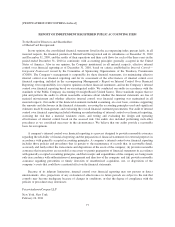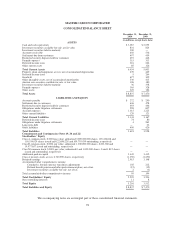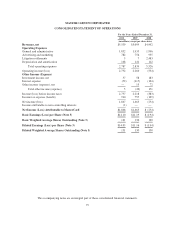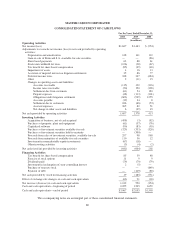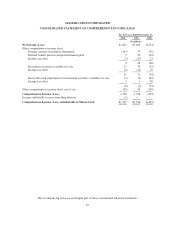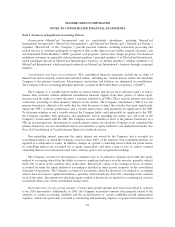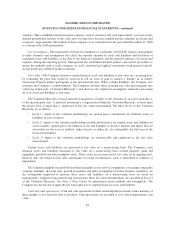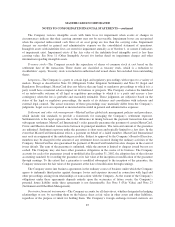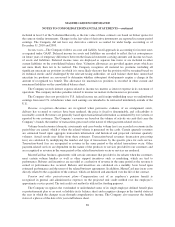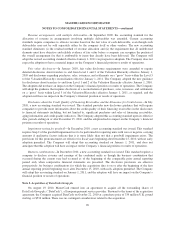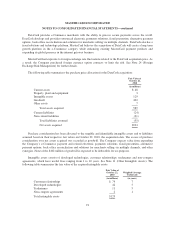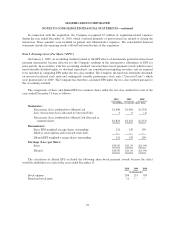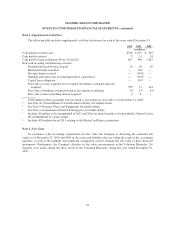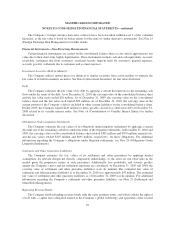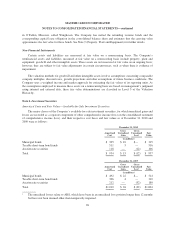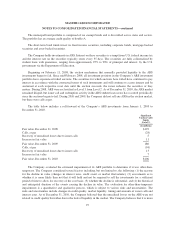MasterCard 2010 Annual Report Download - page 97
Download and view the complete annual report
Please find page 97 of the 2010 MasterCard annual report below. You can navigate through the pages in the report by either clicking on the pages listed below, or by using the keyword search tool below to find specific information within the annual report.MASTERCARD INCORPORATED
NOTES TO CONSOLIDATED FINANCIAL STATEMENTS—continued
The Company reviews intangible assets with finite lives for impairment when events or changes in
circumstances indicate that their carrying amounts may not be recoverable. Impairment losses are recognized
when the expected undiscounted cash flows of an asset group are less than the carrying value. Impairment
charges are recorded in general and administrative expense on the consolidated statement of operations.
Intangible assets with indefinite lives are tested for impairment annually as of October 1, or sooner if indicators
of impairment exist. Impairment exists if the fair value of the indefinite-lived intangible asset is less than
carrying value. See Note 11 (Other Intangible Assets) for further detail on impairment charges and other
information regarding intangible assets.
Treasury stock—The Company records the repurchase of shares of common stock at cost based on the
settlement date of the transaction. These shares are classified as treasury stock, which is a reduction to
stockholders’ equity. Treasury stock is included in authorized and issued shares but excluded from outstanding
shares.
Litigation—The Company is a party to certain legal and regulatory proceedings with respect to a variety of
matters. Except as described in Note 20 (Obligations Under Litigation Settlements) and Note 22 (Legal and
Regulatory Proceedings), MasterCard does not believe that any legal or regulatory proceedings to which it is a
party would have a material adverse impact on its business or prospects. The Company evaluates the likelihood
of an unfavorable outcome of all legal or regulatory proceedings to which it is a party and accrues a loss
contingency when the loss is probable and reasonably estimable. These judgments are subjective based on the
status of the legal or regulatory proceedings, the merits of its defenses and consultation with in-house and
external legal counsel. The actual outcomes of these proceedings may materially differ from the Company’s
judgments. Legal costs are expensed as incurred and recorded in general and administrative expenses.
Settlement and other risk management—MasterCard has global risk management policies and procedures,
which include risk standards to provide a framework for managing the Company’s settlement exposure.
Settlement risk is the legal exposure due to the difference in timing between the payment transaction date and
subsequent settlement. MasterCard International’s rules generally guarantee the payment of certain MasterCard,
Cirrus and Maestro-branded transactions between its principal members. The term and amount of the guarantee
are unlimited. Settlement exposure under the guarantee is short term and typically limited to a few days. In the
event that MasterCard International effects a payment on behalf of a failed member, MasterCard International
may seek an assignment of the underlying receivables. Subject to approval by the Company’s Board of Directors,
members may be charged for the amount of any settlement losses incurred during the ordinary activities of the
Company. MasterCard has also guaranteed the payment of MasterCard-branded travelers cheques in the event of
issuer default. The term of the guarantee is unlimited, while the amount is limited to cheques issued but not yet
cashed. The Company may also have other guarantee obligations in the course of its business. The Company
accounts for each of its guarantees issued or modified after December 31, 2002, the adoption date of the relevant
accounting standard, by recording the guarantee at its fair value at the inception or modification of the guarantee
through earnings. To the extent that a guarantee is modified subsequent to the inception of the guarantee, the
Company remeasures the fair value of the guarantee at the date of modification through earnings.
The Company enters into business agreements in the ordinary course of business under which the Company
agrees to indemnify third parties against damages, losses and expenses incurred in connection with legal and
other proceedings arising from relationships or transactions with the Company. As the extent of the Company’s
obligations under these agreements depends entirely upon the occurrence of future events, the Company’s
potential future liability under these agreements is not determinable. See Note 5 (Fair Value) and Note 23
(Settlement and Other Risk Management).
Derivative financial instruments—The Company accounts for all derivatives, whether designated in hedging
relationships or not, by recording them on the balance sheet at fair value in other assets and other liabilities,
regardless of the purpose or intent for holding them. The Company’s foreign exchange forward contracts are
87


